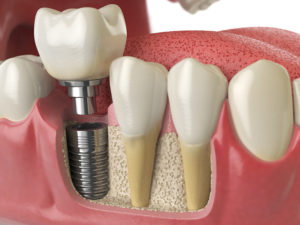 Patients often find that their self-confidence nosedives after tooth loss, and the type of tooth replacement device they choose can either restore peace of mind or contribute to even more self-doubt and anxiety. When it comes to treatments for tooth loss, dental implants outperform the alternatives in terms of stability and durability. Additionally, dental implants can secure a denture more effectively, and they also protect surrounding teeth in replacing a single crown.
Patients often find that their self-confidence nosedives after tooth loss, and the type of tooth replacement device they choose can either restore peace of mind or contribute to even more self-doubt and anxiety. When it comes to treatments for tooth loss, dental implants outperform the alternatives in terms of stability and durability. Additionally, dental implants can secure a denture more effectively, and they also protect surrounding teeth in replacing a single crown.
Why Dental Implants Offer Stability And Longevity
Dental implants become permanent fixtures in a patient’s jaw as a result of the osseointegration process that occurs over several months after an oral surgeon places the implant. The strong bond that forms between the bone tissue and the titanium surface of the dental implant allows the implant to perform many functions associated with the root of a biological tooth.
Although we often take the roots of our teeth for granted, they actually bear responsibility for a significant amount of our smile’s stability. For example, the roots secure the jawbone tissue, which gradually erodes if they are absent following tooth loss. In this way, dental implants help to stabilize the jaw and reduce the atrophy that can result in a conventional appliance becoming looser over time. With proper care, patients can keep an implant-supported prosthetic for decades, rather than needing to have it replaced periodically.
How Dental Implants Secure Your Smile
Dental implants stand alone, which is significant for the security of your prosthetic, whether it is a denture, fixed dental bridge or single crown. Because dental implants are anchored in a patient’s jaw, they are far more effective in keeping a denture in place than denture adhesives, eliminating anxiety about potential slip-ups. Additionally, dental implants eliminate the mess and inconvenience that comes along with such adhesives.
In the case of securing a dental bridge or a single crown, the dental implants have the ability to stand alone without support from surrounding teeth. This means that healthy enamel does not need to be sacrificed by adjacent teeth in order to have crowns placed to secure a pontic, as is the case with conventional dental bridges.
If you’re looking for a more stable, reliable and secure solution for tooth loss, consider dental implants as a possible treatment. Come to our office for an evaluation to learn more about this treatment option so that you can decide if it’s the best choice for you.





